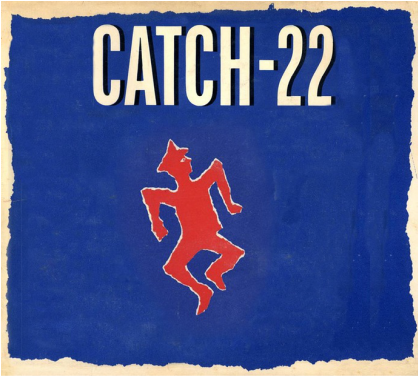
The book's title refers to a sort of circular predicament, which occurs repeatedly throughout the story in different ways. The term is introduced early on by an army psychiatrist who invokes "Catch-22" to explain why any pilot requesting a mental evaluation for insanity - hoping to be found not sane enough to fly so as to escape dangerous missions - actually demonstrates his own sanity in making the request. As a result, he cannot be declared insane.
Here's that funny excerpt from the book (p.52). A conversation between the main character, Yossarian, and the army psychiatrist, Doc Daneeka.
"Can you ground him?"
"I sure can but first he has to ask me to. That's part of the rule."
"Then why doesn't he ask you to?"
"Because he's crazy," Doc Daneeka said. "He has to be crazy to keep flying combat missions after all the close calls he's had. Sure I can ground Orr. But first he has to ask me."
"That's all he has to do to be grounded?"
"That's all. Let him ask me."
"And then you can ground him?" Yossarian asked.
"No, then I can't ground him."
"You mean there's a catch?"
"Sure there's a catch", Doc Daneeka replied. "Catch-22. Anyone who wants to get grounded out of combat duty isn't really crazy."
There was only one catch and that was Catch-22, which specified that a concern for one's own safety in the face of dangers that were real and immediate was the process of a rational mind. Orr was crazy and could be grounded. All he had to do was ask; and as soon as he did, he would no longer be crazy and would have to fly more missions. Orr would be crazy to fly more missions and sane if he didn't, but if he was sane, he had to fly them. If he flew them, he was crazy and didn't have to; but if he didn't want to, he was sane and had to. Yossarian was moved very deeply by the absolute simplicity of this clause if Catch-22 and let out a respectful whistle.
Now an actual word of the English language, Catch-22 refers to an unpleasant situation that you cannot escape because you need to do one thing before doing a second, and you cannot do the second thing before doing the first. It's a no-win and very absurd situation, similar to "damned if I do, damned if I don't"
Here are some other examples of Catch-22:
- A person can't get a job without experience, but can't get experience without a job
- Losing one's glasses is a challenging problem, especially if you can't see
- If the lights are out in a room, one can't see to find the light switch
- One needs a birth certificate to get ID, but you need ID to get a birth certificate
- Needing scissors to cut through the packaging for scissors
Can you think of examples?
-----------
References:
https://en.wikipedia.org/wiki/Catch-22_(logic)
 RSS Feed
RSS Feed